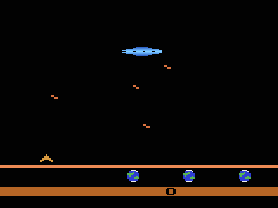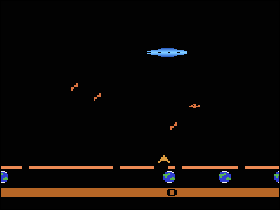 The Game: Players control a single laser cannon responsible for defending several planets who don’t seem to be able to look out for themselves. The cannon squares off against an alien mothership which deploys its own fleet of attack ships to destroy those planets. Good news: the planets are protected by a force field spanning the bottom of the screen. Bad news? The aliens can shoot through it, exposing the row of fragile planets as they scroll across the screen like shooting gallery targets. Worse news? You can’t defend all of them forever. (Games By Apollo, 1982)
The Game: Players control a single laser cannon responsible for defending several planets who don’t seem to be able to look out for themselves. The cannon squares off against an alien mothership which deploys its own fleet of attack ships to destroy those planets. Good news: the planets are protected by a force field spanning the bottom of the screen. Bad news? The aliens can shoot through it, exposing the row of fragile planets as they scroll across the screen like shooting gallery targets. Worse news? You can’t defend all of them forever. (Games By Apollo, 1982)
Memories: Two years after Atari turned its iconic home version of Space Invaders into the first killer app on the VCS, Texas third-party publishing upstart Games By Apollo was one of several companies still trying to improve on that basic formula. The obscurity of Guardian probably means this wasn’t the evolution of the concept that players were looking for.
 If nothing else, Guardian begs for an explanation of its graphical scale: are those some really tiny planets, or is that one hell of a big ship? My money’s on the latter – any mutual agreement between worlds that throws enough cash at a giant shield big enough to cover several planets could probably build a giant, planet-protecting ship with the
If nothing else, Guardian begs for an explanation of its graphical scale: are those some really tiny planets, or is that one hell of a big ship? My money’s on the latter – any mutual agreement between worlds that throws enough cash at a giant shield big enough to cover several planets could probably build a giant, planet-protecting ship with the  change. Still, the planets are a neat way to express the number of “lives” left.
change. Still, the planets are a neat way to express the number of “lives” left.
Guardian didn’t exactly reinvent its genre, but it did try to rearrange some of its conventions.